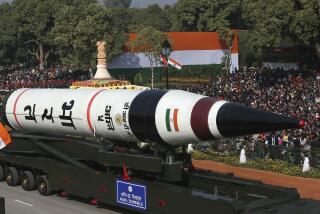Missiles and Common Sense
- Share via
The failure of two out of the three initial tests of a proposed antiballistic missile system hasn’t disheartened the program’s backers or tempered their zeal for rushing ahead, ready or not, with the $60-billion project. Witness the Senate’s rejection--just days after the humiliating fizzle of the most recent test--of a common-sense requirement that future tests be conducted under more realistic conditions. The first tests omitted real-life operational challenges, including multiple decoy warheads and other enemy countermeasures. The latest scripted test, as the Economist magazine put it, should have been like hitting a tethered chicken. Even then it proved a fiasco when the intercepting warhead failed to separate from its booster rocket.
President Clinton has said he will decide later this year whether to begin deploying a national missile defense system (NMD). His decision is supposed to be based on NMD’s cost and technical feasibility and on how U.S. relations with other countries would be affected. Today the heads of American intelligence agencies are to meet to try to reach a consensus on what the international consequences of deploying NMD might be.
Two things are driving NMD at a pace unwarranted by current technology or even the realistic prospects of a missile attack.
One is domestic politics, with conservatives still dreaming of erecting a missile shield that would protect the United States against attack and with the Clinton administration--fearing taunts that it is soft on defense--not having the courage to point out it makes no sense to rush ahead with an unproven system. The other is a disputable deadline: 2005, the earliest date when, according to an estimate by a congressionally appointed commission, North Korea might have a missile able to reach U.S. territory. To be ready for that contingency, work on NMD would have to start by next spring.
NMD backers curiously ignore the great strategic truth of the Cold War era: Nuclear deterrence works, whether the opponent is the powerful Soviet Union or a failed fifth-rate state like North Korea. There’s nothing wrong with exploring the feasibility of a limited missile defense while continuing to rely on deterrence to protect the nation. But any NMD system had better work. The only way to assure that is through rigorous testing, under real-life and not stage-managed conditions. The Senate had the chance to require that. Like the July 8 NMD test, it failed to do what it should have done.
More to Read
Sign up for Essential California
The most important California stories and recommendations in your inbox every morning.
You may occasionally receive promotional content from the Los Angeles Times.













